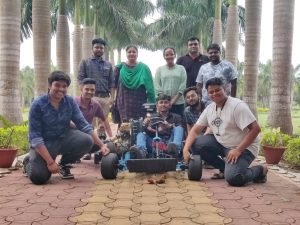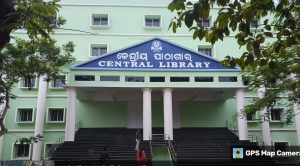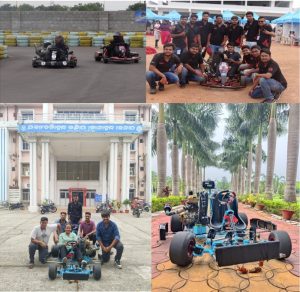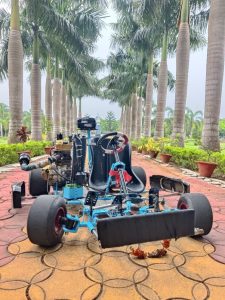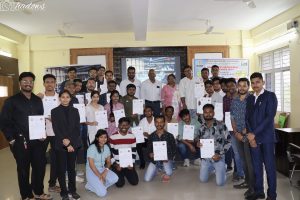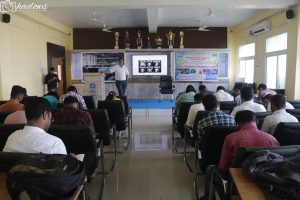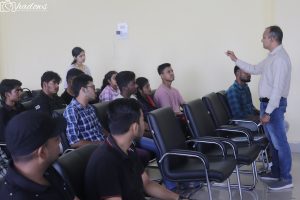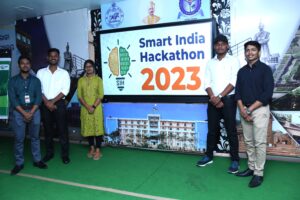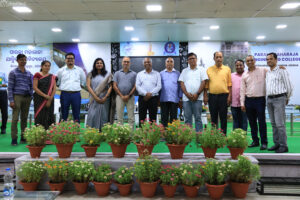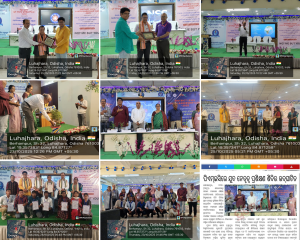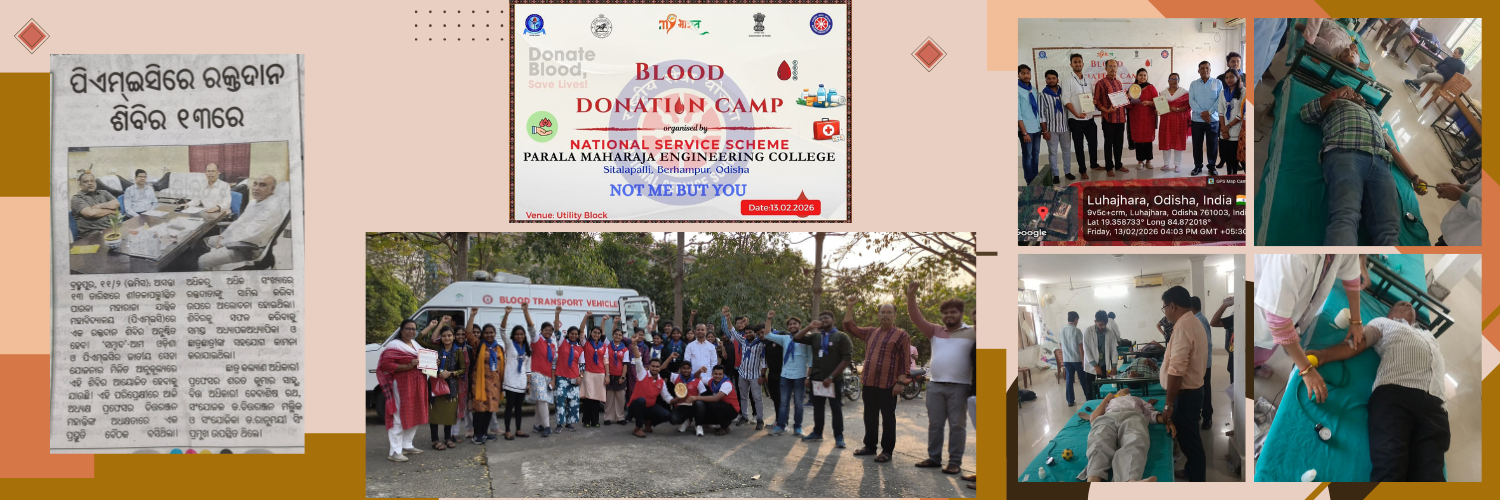






Parala Maharaja Engineering College (PMEC), Berhampur, came into existence on 26th April 2009 with an area of nearly 80 acres. This is an autonomous institution
affiliated with BPUT, Odisha, since 2021, and is the only Govt. Engineering college in South Odisha. It has eight B.Tech programmes and five M.Tech programmes.
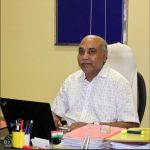
Prof. Chittaranjan Mohanty, Principal
It gives me pleasure to invite you to take a glimpse of the beating heart of Parala Maharaja Engineering
College hidden beneath its attractive exterior. It has experienced continuous growth for more than one decade and made significant accomplishments during this period.
05 MAR
2026
02 MAR
2026
26 FEB
2026
17 FEB
2026
04 FEB
2026
13 NOV
2025
Quick Links
Ranking
& Recognition
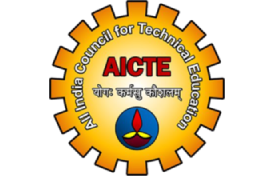

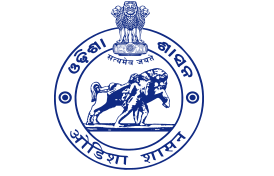
Placement
Partner








Chapter
& Association





Dr. Kanchan Kumari
Automobile Engineering

Dr. Kanchan Kumari
Automobile Engineering
Welcome to the Department of Automobile Engineering at Parala Maharaja Engineering College (PMEC). It gives me immense pleasure to address you through our department's website page and share valuable information about our program.
At PMEC, we take pride in offering a comprehensive and dynamic curriculum in Automobile Engineering. Our aim is to nurture and equip aspiring engineers with the knowledge, skills, and mindset required to excel in the rapidly evolving automotive industry.
Our department is home to a dedicated and experienced faculty who are passionate about teaching and research. They bring a wealth of industry experience and academic expertise to the classroom, ensuring that our students receive a well-rounded education. They are committed to creating a conducive learning environment that encourages intellectual curiosity, critical thinking, and innovation.
We understand the importance of staying abreast of the latest trends and technologies in the field of Automobile Engineering. Therefore, we continuously update our curriculum to incorporate emerging topics such as electric and autonomous vehicles, sustainable transportation, and advanced manufacturing techniques. Through a blend of theory, practical training, and industry exposure, we aim to produce graduates who are not only academically proficient but also industry-ready.
To complement our academic curriculum, we provide state-of-the-art laboratories and workshops equipped with modern tools and equipment. These facilities enable our students to gain hands-on experience, conduct experiments, and undertake research projects. We believe that practical learning is crucial in bridging the gap between theory and application, and our laboratories serve as platforms for students to apply their knowledge and develop technical skills.
As a department, we emphasize holistic development and encourage students to participate in co-curricular activities, technical competitions, and national-level conferences. These engagements provide opportunities for networking, collaboration, and showcasing your talents. We also organize regular industrial visits, guest lectures by industry experts, and workshops to expose our students to real-world scenarios and foster industry-academia interaction.
We take pride in the accomplishments of our alumni, who have carved a niche for themselves in the automotive industry and academia. Their success stories inspire our current students and serve as a testament to the quality of education and training imparted at PMEC.
I encourage you to explore our website further to learn more about our faculty, laboratories, research initiatives, and other relevant information. Whether you are a prospective student, a current student, or a visitor seeking information about our department, we hope that you find the resources on our website informative and engaging.
Please feel free to reach out to us if you have any queries or require additional information. Our faculty and staff are here to assist you on your educational journey and help you realize your aspirations.
Thank you for visiting our website and considering the Department of Automobile Engineering at PMEC. We look forward to welcoming you and being a part of your academic and professional growth.Best regards,
Dr. Kanchan Kumari
Head of the Department,
Automobile Engineering,
PMEC, Berhampur

Dr. Himadri Sahu
Chemical Engineering

Dr. Himadri Sahu
Chemical Engineering
Welcome to the Department of Chemical Engineering at Parala Maharaja Engineering College (PMEC).
Chemical Engineering is a dynamic and exciting field that lies at the intersection of science, engineering, and technology. Our department is dedicated to providing a comprehensive and stimulating educational experience to aspiring chemical engineers, equipping them with the skills and knowledge required to excel in their careers.
At PMEC, we believe in nurturing a spirit of inquiry, innovation, and problem-solving among our students. Our highly qualified and experienced faculty members bring a wealth of expertise and industry experience to the classroom, ensuring that our students receive a well-rounded education. They are committed to fostering an environment of academic excellence, research, and professional development.
Our curriculum is designed to keep pace with the evolving needs of the chemical industry. We offer a diverse range of courses that cover fundamental principles, advanced topics, and emerging areas of chemical engineering. The curriculum is periodically updated to incorporate the latest advancements in areas such as process optimization, sustainable processes, biotechnology, and nanotechnology. Our goal is to produce graduates who possess a strong foundation in chemical engineering principles and are well-prepared to address the challenges of the industry.
Practical learning is an integral part of our program. We have state-of-the-art laboratories and well-equipped facilities that provide hands-on training and research opportunities to our students. These laboratories enable students to apply theoretical concepts, conduct experiments, and gain valuable insights into industrial processes. We encourage students to actively engage in research projects, internships, and industrial training to enhance their practical skills and broaden their horizons.
In addition to academic excellence, we focus on the holistic development of our students. We provide various platforms for students to showcase their talents, such as technical competitions, national-level conferences, and symposiums. We also encourage participation in co-curricular activities and student organizations that promote leadership, teamwork, and communication skills.
Our department maintains strong ties with the industry, and we actively collaborate with renowned organizations to facilitate industrial visits, guest lectures, and internships. These interactions provide valuable industry exposure and networking opportunities for our students, bridging the gap between academia and the real world.
As you navigate through our website, you will find detailed information about our faculty, laboratories, research initiatives, and other relevant resources. Whether you are a prospective student, a current student, or a visitor seeking information about our department, we hope that our website serves as a valuable source of information.
Please feel free to reach out to us if you have any queries or require further assistance. Our faculty and staff are here to support you and guide you on your educational journey.
Thank you for visiting our website and considering the Department of Chemical Engineering at PMEC. We look forward to being a part of your academic and professional growth.
Best regards,
Dr. Himadri Sahu
Head of the Department (Chemical Engineering)
Parala Maharaja Engineering College (PMEC)

Mr. Jagdish Mallick
Civil Engineering

Mr. Jagdish Mallick
Civil Engineering
Greetings from the Department of Civil Engineering at Parala Maharaja Engineering College (PMEC). It is my pleasure to extend a warm welcome to you through our department's website page.
Civil Engineering is a discipline that plays a crucial role in shaping the world we live in. At PMEC, our department is committed to providing a comprehensive and enriching educational experience to aspiring civil engineers. We aim to equip our students with the knowledge, skills, and values required to contribute meaningfully to the field of civil engineering.
Our dedicated faculty members are highly qualified and possess diverse expertise in various domains of civil engineering. They are passionate about teaching, research, and mentoring, and they ensure that our students receive quality education and guidance. They strive to create an engaging learning environment that encourages critical thinking, creativity, and problem-solving skills.
The curriculum offered by our department is designed to meet the evolving needs of the civil engineering industry. It covers a wide range of subjects, including structural analysis and design, geotechnical engineering, transportation engineering, environmental engineering, and construction management. We emphasize a balanced blend of theoretical knowledge and practical application, enabling our students to develop a strong foundation in civil engineering principles and practices.
To complement the academic curriculum, we provide state-of-the-art laboratories and workshops equipped with modern equipment and software. These facilities offer hands-on training and research opportunities, allowing students to explore and experiment with various civil engineering concepts. We encourage students to actively participate in laboratory sessions, research projects, and industry collaborations to enhance their practical skills and gain real-world experience.
At PMEC, we believe in holistic development and strive to foster the overall growth of our students. We provide opportunities for students to engage in co-curricular activities, technical competitions, and professional societies. These platforms enhance their communication skills, teamwork abilities, and leadership qualities. We also organize expert lectures, workshops, and industrial visits to provide exposure to the latest advancements and practices in the field.
Our department maintains strong industry connections and collaborates with renowned organizations to bridge the gap between academia and industry. Through internships, industrial training, and guest lectures by industry experts, we ensure that our students gain practical insights and are well-prepared for their professional careers.
I invite you to explore our website to learn more about our faculty, laboratories, research projects, and other relevant information. Whether you are a prospective student, a current student, or a visitor seeking information about our department, we hope that our website serves as a valuable resource.
Please feel free to reach out to us if you have any queries or require further assistance. Our faculty and staff are here to support and guide you throughout your educational journey.
Thank you for visiting our website and considering the Department of Civil Engineering at PMEC. We look forward to being a part of your academic and professional growth.
Best regards,
Mr. Jagdish Mallick
Head of the Department (Civil Engineering)
Parala Maharaja Engineering College (PMEC)

Dr. Ranumayee Sing
Computer Science and Engineering

Dr. Ranumayee Sing
Computer Science and Engineering
Message from HOD's desk
Welcome to the department of Computer Science and Engineering at Parala Maharaja Engineering College, Berhampur, Odisha. The department works with the objective of addressing critical challenges faced by the Industry, society and the academia. Perhaps even more important is our unceasing commitment to our students, helping them to learn, grow, develop, and achieve their goals in their pursuit to excel in their professional career.
Department of Computer Science and Engineering is one of the strongest department in Parala Maharaja Engineering College with an active presence in vast Computer Science research areas. The department’s graduate programs continue to draw from a very strong application pool. The department was established in the year 2009 and since its inception the department has evolved to pioneering the state of Computer science and engineering education in South Odisha
The department faculty work with excellent team spirit in different technical teams which lead to key research publications in these areas. The department strives to provide a conducive environment for the students to develop analytical and practical skills and apply them to real world problems. The department has three on going projects from different funding agencies to keep fueling its passion towards R&D. To motivate the students the department organizes regular training in state of art software & hardware, arranges workshop, technical events, seminars & industrial visits.
We welcome you to the Computer Science and Engineering Department as a promising student and we hope to be part of your success.
Mrs. Ranumayee Sing
Head Dept. of Computer Science and Engineering,
Parala Maharaja Engineering College, Berhampur, Odisha

Dr. Bhagabat Panda
Electrical Engineering

Dr. Bhagabat Panda
Electrical Engineering
Welcome to the department of Electrical Engineering at Parala Maharaja Engineering College, Berhampur, Odisha. The department works with the objective of addressing critical challenges faced by the Industry, society and the academia. Perhaps even more important is our unceasing commitment to our students, helping them to learn, grow, develop, and achieve their goals in their pursuit to excel in their professional career.
Department of Electrical Engineering is one of the largest department in Parala Maharaja Engineering College with nearly 18 faculty members and more than 500 undergraduate and master’s students. The department’s graduate programs continue to draw from a very strong application pool. The department was established in the year 2009 and since its inception the department has evolved from offering only undergraduate courses to offer post graduate and doctoral programmes in key areas of electrical engineering.
The department faculty work with excellent team spirit in different technical team like Power System, Electrical Machines, Power Electronics, Modern Electric Drives, Control System, Renewable Energy, Electrical Measurement & Instrumentation, Power Generation, Communication systems, Electronic gadgets, Programming of Microcontroller, Digital System Design etc. which leads to key research publications in these areas. The department strives to provide a conductive environment for the students to develop analytical and practical skills and apply them to real world problems. To motivate the students the department organizes regular training in state of art software & hardware, arranges workshop, technical events, seminars & industrial visit.
We welcome you to the Electrical Engineering Department as undergraduate or post graduate or research student and we hope to be part of your success.
Dr. Bhagabat Panda
Professor and Head
Dept. of Electrical Engineering
Parala Maharaja Engineering College, Berhampur, Odisha
It is generally believed that it is the students who derive benefit by working under the guidance of a professor. In reality, the professor benefits equally by his association with gifted students working under him. -C. V. Raman

Mr. Nawal Topno
Electronics and Telecommunication

Mr. Nawal Topno
Electronics and Telecommunication
Welcome to the Department of Electronics and Telecommunication Engineering at Parala Maharaja Engineering College (PMEC). I extend a warm greeting to you through our department's website page.
The field of Electronics and Telecommunication Engineering is at the forefront of technological advancements, shaping the way we communicate and connect with the world. At PMEC, our department is dedicated to providing a comprehensive and cutting-edge education to aspiring engineers in this dynamic discipline.
Our esteemed faculty members bring a wealth of experience and expertise to the classroom. They are passionate about teaching and research, and they strive to impart the necessary knowledge and skills to our students. With a focus on innovation, critical thinking, and problem-solving, we aim to create a learning environment that nurtures creativity, technical proficiency, and a deep understanding of the subject.
The curriculum offered by our department is designed to cater to the evolving needs of the electronics and telecommunication industry. It encompasses a wide range of subjects, including digital electronics, analog and digital communication, VLSI design, signal processing, wireless communication, and networking. The curriculum is regularly updated to incorporate the latest advancements and emerging technologies, ensuring that our students are well-prepared to tackle the challenges of the industry.
To complement the theoretical aspects, we provide state-of-the-art laboratories and advanced software tools that facilitate hands-on learning. Our well-equipped laboratories enable students to gain practical experience in areas such as electronics circuits, communication systems, VLSI design, and embedded systems. Through hands-on experiments, projects, and research work, we encourage our students to apply their theoretical knowledge and develop a strong foundation in practical skills.
At PMEC, we believe in holistic development and offer various opportunities for our students to explore their interests and talents. We encourage active participation in technical competitions, workshops, seminars, and national-level conferences to foster innovation, collaboration, and professional growth. We also promote the formation of student chapters and organizations that provide platforms for networking and industry interaction.
Our department maintains strong ties with the industry and collaborates with renowned organizations to bridge the gap between academia and the real world. Through industry internships, industrial visits, and guest lectures by industry experts, our students gain valuable insights into industry practices and trends. These interactions not only supplement classroom learning but also enhance their employability and make them industry-ready.
I invite you to explore our website to learn more about our faculty, laboratories, research projects, and other relevant information. Whether you are a prospective student, a current student, or a visitor seeking information about our department, we hope that our website serves as a valuable resource.
Please feel free to reach out to us if you have any queries or require further assistance. Our faculty and staff are here to support and guide you on your educational journey.
Thank you for visiting our website and considering the Department of Electronics and Telecommunication Engineering at PMEC. We look forward to being a part of your academic and professional growth.
Best regards,
Mr. Nawal Topno
Head of the Department (Electronics and Telecommunication Engineering)
Parala Maharaja Engineering College (PMEC)

Mrs. Anukampa C. Pattnaik
Mechanical Engineering

Mrs. Anukampa C. Pattnaik
Mechanical Engineering
Welcome to the Department of Mechanical Engineering at Parala Maharaja Engineering College (PMEC). I am delighted to address you through our department's website page.
Mechanical Engineering is a diverse and ever-evolving field that lies at the heart of technological advancements. At PMEC, our department is dedicated to providing a comprehensive education that prepares our students to become skilled engineers, innovators, and problem solvers in the realm of mechanical systems and technologies.
Our esteemed faculty members bring a wealth of experience and expertise to the classroom. They are committed to imparting quality education and nurturing the professional growth of our students. With a strong focus on theoretical foundations, practical applications, and hands-on experiences, we strive to create a learning environment that fosters innovation, critical thinking, and a deep understanding of the subject.
The curriculum offered by our department is designed to meet the evolving needs of the industry and equip our students with the necessary knowledge and skills. It covers a wide range of subjects, including thermodynamics, fluid mechanics, solid mechanics, manufacturing processes, machine design, robotics, and renewable energy systems. The curriculum is regularly updated to incorporate the latest industry trends, emerging technologies, and sustainability principles.
To complement the theoretical aspects, we provide well-equipped laboratories and advanced software tools that facilitate hands-on learning and experimentation. Our state-of-the-art laboratories allow students to gain practical experience in areas such as fluid mechanics, heat transfer, dynamics, materials testing, and CAD/CAM. Through project work and research initiatives, we encourage our students to apply their theoretical knowledge, enhance their problem-solving abilities, and develop a strong foundation in practical skills.
At PMEC, we believe in holistic development and offer various opportunities for our students to excel beyond the classroom. We encourage active participation in technical competitions, workshops, seminars, and conferences to foster innovation, teamwork, and leadership skills. We also provide platforms for students to engage in co-curricular activities, industry internships, and research projects to enhance their overall learning experience and employability.
Our department maintains strong industry connections and collaborations with leading organizations. We facilitate industrial visits, internships, and guest lectures by industry experts to provide our students with exposure to real-world engineering challenges and practices. These interactions also enable students to stay updated with the latest industry requirements and foster potential career opportunities.
I invite you to explore our website to learn more about our faculty, laboratories, research projects, and other relevant information. Whether you are a prospective student, a current student, or a visitor seeking information about our department, we hope that our website serves as a valuable resource.
Please feel free to reach out to us if you have any queries or require further assistance. Our faculty and staff are here to support and guide you on your educational journey.
Thank you for visiting our website and considering the Department of Mechanical Engineering at PMEC. We look forward to being a part of your academic and professional growth.
Best regards,
MRS. Anukampa Chau Pattnaik
Head of the Department (Mechanical Engineering)
Parala Maharaja Engineering College (PMEC)

Dr. Chitrasen Samantra
Metallurgical and Materials Engg

Dr. Chitrasen Samantra
Metallurgical and Materials Engg
Welcome to the Department of Metallurgical and Material Engineering at Parala Maharaja Engineering College (PMEC).
Metallurgical and Material Engineering is a fascinating and dynamic field that encompasses the study of metals, alloys, and materials used in various industries. At PMEC, our department is committed to providing a comprehensive education that equips our students with the knowledge, skills, and expertise required for a successful career in this field.
Our dedicated faculty members are highly qualified and possess extensive industrial and academic experience. They are passionate about teaching, research, and innovation, and they strive to create a stimulating learning environment that nurtures creativity, critical thinking, and problem-solving abilities.
The curriculum offered by our department is designed to provide a strong foundation in metallurgical and material engineering principles. It covers a wide range of subjects, including physical metallurgy, mechanical behavior of materials, corrosion engineering, materials characterization, extractive metallurgy, and industrial metallurgy. The curriculum is regularly updated to incorporate the latest advancements and emerging technologies, ensuring that our students are well-prepared for the ever-changing industry landscape.
To complement the theoretical knowledge, we provide well-equipped laboratories and advanced research facilities. Our laboratories are equipped with modern equipment and instruments to facilitate hands-on learning and experimentation. Through practical sessions and research projects, we encourage our students to apply theoretical concepts and gain practical insights into metallurgical and material engineering practices.
At PMEC, we believe in holistic development and offer various opportunities for our students to develop their overall personality and skills. We encourage active participation in technical competitions, seminars, workshops, and industrial visits to enhance their technical knowledge, communication skills, and industry exposure. We also encourage students to engage in research projects, internships, and industrial collaborations to gain practical experience and prepare for their professional careers.
Our department maintains strong industry connections and collaborates with renowned organizations to bridge the gap between academia and industry. Through industrial visits, guest lectures by industry experts, and internships, we expose our students to real-world challenges and provide them with valuable insights into industrial practices. These interactions also facilitate potential career opportunities and networking for our students.
I invite you to explore our website to learn more about our faculty, laboratories, research projects, and other relevant information. Whether you are a prospective student, a current student, or a visitor seeking information about our department, we hope that our website serves as a valuable resource.
Please feel free to reach out to us if you have any queries or require further assistance. Our faculty and staff are here to support and guide you on your educational journey.
Thank you for visiting our website and considering the Department of Metallurgical and Material Engineering at PMEC. We look forward to being a part of your academic and professional growth.
Best regards,
Dr. Chitrasen Samantra
Head of the Department (I/C) (MME)
Parala Maharaja Engineering College (PMEC)

Dr. Satrujit Mishra
Basic Sciences

Dr. Satrujit Mishra
Basic Sciences
Welcome to the Department of Humanities and Social Sciences at Parala Maharaja Engineering College (PMEC). It is my pleasure to address you through our department's website page.
The Department of Humanities and Social Sciences plays a crucial role in providing a well-rounded education to the students of Parala Maharaja Engineering College. We offer a diverse range of subjects, including Physics, Chemistry, and Mathematics, which form the backbone of engineering education and foster a strong foundation for technical knowledge and problem-solving skills.
At PMEC, we believe in the importance of a comprehensive education that combines technical expertise with a deep understanding of fundamental sciences. Our faculty members are highly qualified and experienced in their respective fields, bringing their expertise and passion for teaching to the classroom. They are committed to instilling critical thinking, analytical skills, and a scientific temperament in our students.
The Department of Humanities and Social Sciences aims to develop well-rounded engineers who possess a strong foundation in physics, chemistry, and mathematics. These subjects are essential for understanding the fundamental principles underlying various engineering disciplines. Our curriculum is designed to provide a thorough understanding of these subjects, enabling students to apply scientific principles to solve complex engineering problems.
Physics is the study of the fundamental laws and principles that govern the physical world. Our courses in physics provide a comprehensive understanding of classical mechanics, electromagnetism, quantum mechanics, and other core areas. Through theoretical knowledge and laboratory experiments, we enable students to develop a deep understanding of physical phenomena and their applications in engineering.
Chemistry plays a vital role in engineering, particularly in fields such as materials science, environmental engineering, and chemical engineering. Our courses in chemistry cover topics such as inorganic chemistry, organic chemistry, physical chemistry, and environmental chemistry. We emphasize the practical aspects of chemistry, providing hands-on laboratory experience and fostering an understanding of the chemical properties and reactions that are integral to engineering applications.
Mathematics forms the foundation of engineering and provides the tools and techniques necessary for solving complex engineering problems. Our courses in mathematics cover a wide range of topics, including calculus, differential equations, linear algebra, probability, and statistics. Through rigorous mathematical training, we equip our students with the analytical and problem-solving skills required in engineering practice.
In addition to these core subjects, the Department of Humanities and Social Sciences also offers elective courses that broaden students' perspectives and enhance their skills. These may include courses in technical writing, communication skills, environmental studies, and sustainability, enabling students to develop effective communication skills, critical thinking abilities, and a broader understanding of social and environmental issues.
We believe in holistic development and encourage our students to actively participate in co-curricular activities, workshops, seminars, and conferences. These engagements provide opportunities for personal growth, teamwork, leadership development, and cultural exchange. We also encourage students to engage in research projects and community outreach initiatives that foster social responsibility and empathy.
I invite you to explore our website to learn more about our faculty, courses, research activities, and other relevant information. Whether you are a prospective student, a current student, or a visitor seeking information about our department, we hope that our website serves as a valuable resource.
Please feel free to reach out to us if you have any queries or require further assistance. Our faculty and staff are here to support and guide you on your educational journey.
Thank you for visiting our website and considering the Department of Humanities and Social Sciences at PMEC. We look forward to being a part of your academic and professional growth.
Best regards,
Dr. Satrujit Mishra
Head of the Department (Basic Sciences)
Parala Maharaja Engineering College (PMEC)

Dr. Manisha Chhotray
Humanities and Social Sciences

Dr. Manisha Chhotray
Humanities and Social Sciences
Welcome to the Department of Humanities and Social Sciences at Parala Maharaja Engineering College (PMEC).
The Department of Humanities and Social Sciences plays a vital role in providing a well-rounded education to the students of Parala Maharaja Engineering College. We offer a diverse range of subjects, including English, Economics, and Management, to equip our engineering students with a holistic understanding of the social, cultural, and economic aspects that complement their technical education.
At PMEC, we believe in the significance of a strong foundation in humanities and social sciences. Our faculty members are highly qualified and experienced in their respective fields, bringing a wealth of knowledge and expertise to the classroom. They are passionate about instilling critical thinking, communication skills, and ethical values in our students.
The Department of Humanities and Social Sciences aims to develop well-rounded engineers who possess excellent communication skills, a global perspective, and an understanding of the societal impact of engineering solutions. Our curriculum is designed to provide a comprehensive understanding of language, literature, economics, and management principles, enabling students to become effective communicators, decision-makers, and leaders.
English language proficiency is essential for effective communication and professional success. We offer courses that focus on enhancing students' communication skills, both written and oral. Through language labs, interactive sessions, and workshops, we aim to improve students' language proficiency, enabling them to effectively express their ideas and thoughts.
Economics is a fundamental discipline that helps engineers understand the economic principles and decision-making processes that underpin engineering projects. Our courses in economics provide a foundation in microeconomics, macroeconomics, and applied economics, enabling students to analyze and assess the economic viability and sustainability of engineering projects.
Management courses equip engineering students with essential business and managerial skills, fostering their ability to work effectively in teams, lead projects, and understand the business aspects of engineering enterprises. Through courses in management principles, organizational behavior, project management, and entrepreneurship, we prepare our students for leadership roles and provide them with a holistic perspective on engineering projects.
The Department of Humanities and Social Sciences also offers elective courses that encourage students to explore their interests and broaden their horizons. These courses cover diverse subjects such as psychology, sociology, environmental studies, and sustainable development, enabling students to develop a well-rounded understanding of the social and environmental aspects of engineering.
We believe in holistic development and encourage our students to actively participate in co-curricular activities, workshops, seminars, and conferences. These engagements provide opportunities for personal growth, networking, and cultural exchange. We also encourage students to engage in research projects and community outreach initiatives that foster social responsibility and empathy.
I invite you to explore our website to learn more about our faculty, courses, research activities, and other relevant information. Whether you are a prospective student, a current student, or a visitor seeking information about our department, we hope that our website serves as a valuable resource. Please feel free to reach out to us if you have any queries or require further assistance. Our faculty and staff are here to support and guide you on your educational journey.
Thank you for visiting our website and considering the Department of Humanities and Social Sciences at PMEC. We look forward to being a part of your academic and professional growth.
Best regards,
Dr. Manisha Chhotray
Head of the Department (Humanities and Social Sciences)
Parala Maharaja Engineering College (PMEC)
Dr. Sourav Kumar Bhoi (CSE Dept.) elevated to Senior Member Grade by IEEE in
2023.
Dr.Raghunandan Swain (ETC Dept.) received a research project from MEitY, Govt.
of India 2023.
Dr.Sarat Kumar Sahoo (EE Dept.) selected as Top 2% Scientist in the World as per
Scopus 2022.
Mr.Bishal Rana of 2019-23 Batch of CSE Dept. received package of 12LPA by
getting placed in US based organization Courtroom Insight.
Mr.Ritam Mohanty of 2019-23 Batch of CSE Dept. got GATE All India Rank-384
Dr.Dinesh Kumar Dash (ETC) received a research project from MEitY, Govt. of
India 2023.
Dr.Sourav Kumar Bhoi (CSE Dept.) set a record on India Book of Record 2022 for
writing 46 research papers in 14 different technologies.
Dr.Raghunandan Swain (ETC Dept.) elevated to Senior Member Grade by IEEE in
2022.
Dr.Dinesh Kumar Dash (ETC) Dept. received Appreciation from Cabinet Minister,
Ministry of Education, Govt. of India for translating BEE book into Odia
Language.

 ICORSVB 2025
ICORSVB 2025









